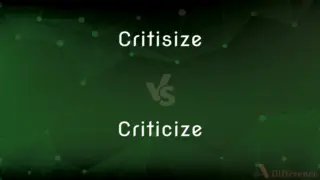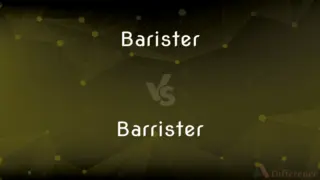Naration vs. Narration — Which is Correct Spelling?
By Tayyaba Rehman — Updated on March 22, 2024
"Naration" is a misspelling. The correct spelling is "Narration," which refers to the act or process of telling a story or describing an event.

Table of Contents
Which is correct: Naration or Narration
How to spell Narration?

Naration
Incorrect Spelling

Narration
Correct Spelling
ADVERTISEMENT
Key Differences
"Narration" has two "r"s, while "Naration" mistakenly has one.
Think of "narrate" which also has two "r"s.
Mnemonic: "Narrative" stories need "Narration" with two "r"s.
Remember, double the "r" before adding "-tion."
Relate it to "narrator," which also has two "r"s.
ADVERTISEMENT
How Do You Spell Narration Correctly?
Incorrect: I prefer stories with descriptive naration.
Correct: I prefer stories with descriptive narration.
Incorrect: She enjoyed reading books with good naration.
Correct: She enjoyed reading books with good narration.
Incorrect: His naration added depth to the documentary.
Correct: His narration added depth to the documentary.
Incorrect: The naration in the game was interactive and engaging.
Correct: The narration in the game was interactive and engaging.
Incorrect: The movie's naration was difficult to follow.
Correct: The movie's narration was difficult to follow.
Narration Definitions
The process or art of narrating.
He has a talent for narration.
An account or description of events.
Her narration of the journey was captivating.
The part of a literary work that provides background information.
The narration in the novel was extensive and detailed.
The act of telling a story or account.
The movie's narration was gripping.
The commentary accompanying a film or broadcast.
Morgan Freeman's narration in documentaries is iconic.
The act, process, or an instance of narrating.
Narrated material.
The act of recounting or relating in order the particulars of some action, occurrence, or affair; a narrating.
That which is narrated or recounted; an orderly recital of the details and particulars of some transaction or event, or of a series of transactions or events; a story or narrative.
(rhetoric) That part of an oration in which the speaker makes his or her statement of facts.
The act of telling or relating the particulars of an event; a recital of certain events, usually in chronological order; rehearsal.
That which is related; the relation in words or writing of the particulars of any transaction or event, or of any series of transactions or events; a narrative; story; history.
That part of a discourse which recites the time, manner, or consequences of an action, or simply states the facts connected with the subject.
A message that tells the particulars of an act or occurrence or course of events; presented in writing or drama or cinema or as a radio or television program;
His narrative was interesting
Disney's stories entertain adults as well as children
The act of giving an account describing incidents or a course of events;
His narration was hesitant
(rhetoric) the second section of an oration in which the facts are set forth
Narration Meaning in a Sentence
The narrator's voice in the film was soothing and added to the overall experience.
Narration is used in video games to provide backstory and context.
In oral storytelling, the narrator's skill in narration is key to captivating the audience.
Narration can be from a first-person perspective, offering insight into the narrator's thoughts.
Third-person narration provides a broader view of the story and its characters.
A film's narration can offer commentary or philosophical insights.
Narration helps to convey the story's mood and themes.
A good narration can bring characters to life in audiobooks.
The quality of the narration greatly affects the viewer's understanding of a documentary.
Children's books often use simple narration to hold the attention of young readers.
Voice-over narration is a common technique in both film and television.
The style and tone of narration contribute to the story's atmosphere.
The use of multiple narrators can add layers of complexity to a narrative.
Narration in instructional videos helps to explain and guide the viewer.
Narration in interactive media can respond to the player's decisions.
The use of narration in theater can bridge scenes and provide exposition.
Narration techniques have evolved with advances in technology and storytelling mediums.
In non-linear narratives, the narration might jump between different times or perspectives.
Narration in podcasts can vary from conversational to highly scripted.
In audiobooks, the narrator's ability to differentiate characters through voice is important.
The choice of narrator can influence the credibility and relatability of the narration.
Experimental narratives may use unconventional forms of narration to challenge or engage the audience.
Historical documentaries rely on narration to provide context and analysis.
Effective narration requires careful choice of words and pacing.
Personal narration, where the author shares their own experiences, can create a strong connection with the reader.
Common Curiosities
What is the pronunciation of Narration?
It is pronounced as /nəˈreɪ.ʃən/.
What is the verb form of Narration?
The verb form is "narrate."
What is the root word of Narration?
The root word is "narrate."
Which vowel is used before Narration?
The vowel "a" is used.
Is Narration an abstract noun?
Yes, because it represents a concept rather than a tangible thing.
What is the singular form of Narration?
Narration is singular.
Why is it called Narration?
It's derived from the verb "narrate," meaning to tell or give an account.
Which article is used with Narration?
Both "a" and "the" can be used with narration.
Which conjunction is used with Narration?
Any conjunction can be used with "narration" based on context; "and" and "or" are common.
What is the plural form of Narration?
Narrations.
Is Narration a countable noun?
Yes, you can have multiple narrations.
How many syllables are in Narration?
Three syllables.
Which preposition is used with Narration?
"Of" can be used, as in "narration of an event."
Is Narration a vowel or consonant?
"Narration" is a word and contains both vowels and consonants.
Is the word “Narration” a Direct object or an Indirect object?
"Narration" can serve as a direct object, e.g., "She provided the narration."
What is the opposite of Narration?
There isn't a direct opposite, but "silence" or "non-disclosure" can contrast it contextually.
Is the Narration term a metaphor?
No, unless used in a figurative context.
Is the word Narration imperative?
No, "narration" is not imperative.
How do we divide Narration into syllables?
Nar-ra-tion.
What is a stressed syllable in Narration?
The second syllable "ra" is stressed.
Which determiner is used with Narration?
Determiners like "this," "that," or "the" can be used.
What is the second form of Narration?
For the verb "narrate," it's "narrated."
Is Narration an adverb?
No, "narration" is not an adverb.
What part of speech is Narration?
It's a noun.
What is another term for Narration?
Storytelling.
What is the first form of Narration?
The word "narration" doesn't have verb forms as it's a noun. The verb "narrate" has "narrate" as its first form.
How is Narration used in a sentence?
"The actor's narration added depth to the documentary."
Is Narration a noun or adjective?
"Narration" is a noun.
Is Narration a negative or positive word?
Neutral; however, context can give it positive or negative connotations.
Is Narration a collective noun?
No, it is not a collective noun.
Is the word Narration a gerund?
No, it's a noun.
What is the third form of Narration?
For the verb "narrate," it's also "narrated."
Share Your Discovery

Previous Comparison
Critisize vs. Criticize
Next Comparison
Barister vs. BarristerAuthor Spotlight
Written by
Tayyaba RehmanTayyaba Rehman is a distinguished writer, currently serving as a primary contributor to askdifference.com. As a researcher in semantics and etymology, Tayyaba's passion for the complexity of languages and their distinctions has found a perfect home on the platform. Tayyaba delves into the intricacies of language, distinguishing between commonly confused words and phrases, thereby providing clarity for readers worldwide.


































